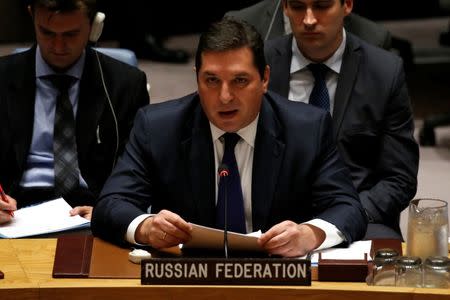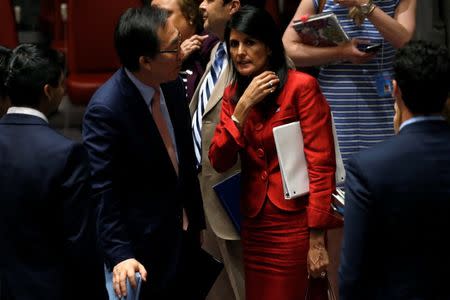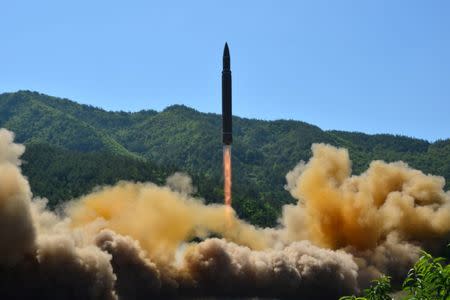Russia objects to U.N. condemnation of North Korea, says test was not ICBM
By Michelle Nichols UNITED NATIONS (Reuters) - Russia objected on Thursday to a United Nations Security Council condemnation of North Korea's latest rocket launch because the U.S.-drafted statement labelled it an intercontinental ballistic missile (ICBM) and Moscow disagrees, diplomats said. Security Council statements have to be agreed by all 15 members. The Russian mission to the United Nations said it had proposed amendments to the U.S. draft. It was not immediately clear if the United States would continue to negotiate with Russia in an effort to reach a council consensus on a statement. Moscow's resistance to defining Pyongyang's missile launch as long-range does not augur well for Washington's planned push to impose new U.N. sanctions on North Korea. U.S. Ambassador to the United Nations Nikkei Haley said on Wednesday that she plans to propose new measures in coming days. Moscow has said it believes North Korea fired an intermediate range ballistic missile on Tuesday, while China has not identified the rocket launched. North Korea said it tested an ICBM and the United States said that was likely true. "The rationale is that based on our (Ministry of Defence's) assessment we cannot confirm that the missile can be classified as an ICBM," Russia's U.N. mission said in an email to its Security Council colleagues. "Therefore we are not in a position to agree to this classification on behalf of the whole council since there is no consensus on this issue," the email said. Haley on Wednesday denounced Russia's reluctance to recognise that North Korea had test-launched an ICBM, which some experts believe has the range to reach the U.S. states of Alaska and Hawaii. "If you need any sort of intelligence to let you know that the rest of the world sees this as an ICBM, I'm happy to provide it," she told the Security Council on Wednesday. POSSIBLE SANCTIONS Haley did not give details on what sanctions would be proposed, but outlined available options. North Korea has been under U.N. sanctions since 2006 over its ballistic missile and nuclear programs. "The international community can cut off the major sources of hard currency to the North Korean regime. We can restrict the flow of oil to their military and their weapons programs. We can increase air and maritime restrictions. We can hold senior regime officials accountable," Haley told the council meeting. Diplomats said Washington proposed such options to Beijing two months ago, but that China had not engaged in discussions on the measures and instead only agreed to adding some people and entities to the existing U.N. sanctions list in June. Following a nuclear weapons test by North Korea in September, while U.S. President Barack Obama was still in office, it took the U.N. Security Council three months to agree strengthened sanctions. It was not immediately clear how long U.S. President Donald Trump's administration was prepared to negotiate with China and Russia on possible new U.N. sanctions. Trump has threatened to use trade to pressure Beijing to do more to rein in North Korea and U.S. officials have said the United States might seek unilaterally to sanction more Chinese companies that do business with North Korea, especially banks. (Reporting by Michelle Nichols; Editing by Alistair Bell and James Dalgleish)

 Yahoo News
Yahoo News 


